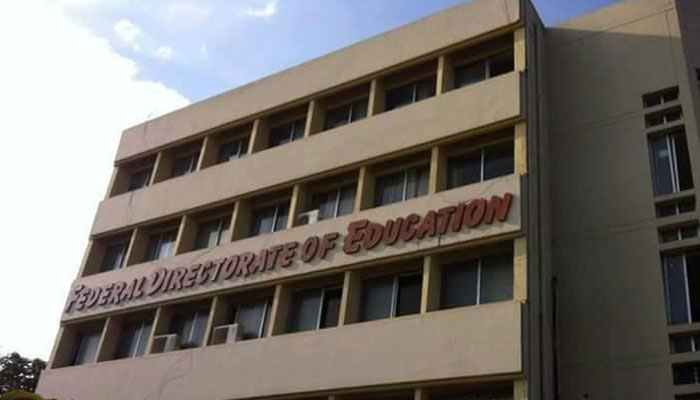Govt executes project to modernise federal govt’s educational institutions
A total of 99 educational institutions modernized for boys in rural areas which includes 5 colleges
ISLAMABAD: To enhance better education in the federal capital schools, the government has executed projects worth billions of rupees with key interventions in public schools situated in the rural areas.
With financial resource of nearly 20 billion rupees, the Federal Directorate of Education (FDE) has renovated 432 public educational institutions where 2,43,339 students have already been enrolled with 12,595 teachers and faculty members, a detailed report shared by Secretary Education and Professional Training Mohyuddin Wani reveals.
The detailed report highlights efforts by the government to improve the overall educational standards of schools in the rural areas of the federal capital. A total of 99 educational institutions have been modernized for boys in the rural areas which includes 5 colleges. Whereas 96 institutions have been modernized for girls with six colleges.
In addition, 92 institutions have been renovated and modernized for both boys and girls in the rural areas. Initiated from the start of this year, the key initiatives in the rural areas educational institutions include high-end computers, smart screens, better internet connectivity, enhanced security systems, professional training to leverage labs for 21st century digital learning and introduction of LMS & digital content to the students.
Out of the total 50 leverage labs for digitalized learning, 43 are constructed in the rural high schools. Apart from this, to improve teaching performance and teachers learning in schools, especially in the rural areas, the National Institute of Excellence in Teacher Education has trained over 4,000 teachers across ICT which benefitted over 90,000 students already, the report states.
The training of teachers includes scripted pedagogy along with in-person coaching, assessment creation and grading tools, analytics and visibility for school leaders and bureaucracy, at home learning support and communication with parents, and last but not least, policy support to help decision makers create the right incentives. This training program of teachers has so far covered a total of 342 primary schools.
Further, Interactive Smart Boards have been installed in a total of 114 schools to enhance student learning experience through the use of technology. Out of the total schools where these smart boards have been installed, 63 schools are in rural areas and 51 in urban areas.
The smart boards with 65 inch size support Core-i5 and Android both, with storage capacity of one TB. Moreover, creation of Chromebook labs is also in process which according to the data shared will be deployed in one month.
Chromebooks provide students with essential digital tools and resources which is affordable and durable with low costs and lasting battery life. A total of 1,000 Chromebooks have been bought out of which 800 will be deployed in the rural schools. For high-speed internet, two devices have been installed in every school in the rural areas of the capital to enable interactive and live educational support along with online learning resources.
The concept of smart classrooms for interactive learning has also been developed. The total smart schools are 206 out of which 117 are in rural areas. In addition, the World Bank has also provided 100 laptops, 10 smart board with projectors and four smart boards and all of them are deployed in the rural schools.
-
 James Van Der Beek's Friends Helped Fund Ranch Purchase Before His Death At 48
James Van Der Beek's Friends Helped Fund Ranch Purchase Before His Death At 48 -
 King Charles ‘very Much’ Wants Andrew To Testify At US Congress
King Charles ‘very Much’ Wants Andrew To Testify At US Congress -
 Rosie O’Donnell Secretly Returned To US To Test Safety
Rosie O’Donnell Secretly Returned To US To Test Safety -
 Meghan Markle, Prince Harry Spotted On Date Night On Valentine’s Day
Meghan Markle, Prince Harry Spotted On Date Night On Valentine’s Day -
 King Charles Butler Spills Valentine’s Day Dinner Blunders
King Charles Butler Spills Valentine’s Day Dinner Blunders -
 Brooklyn Beckham Hits Back At Gordon Ramsay With Subtle Move Over Remark On His Personal Life
Brooklyn Beckham Hits Back At Gordon Ramsay With Subtle Move Over Remark On His Personal Life -
 Meghan Markle Showcases Princess Lilibet Face On Valentine’s Day
Meghan Markle Showcases Princess Lilibet Face On Valentine’s Day -
 Harry Styles Opens Up About Isolation After One Direction Split
Harry Styles Opens Up About Isolation After One Direction Split -
 Shamed Andrew Was ‘face To Face’ With Epstein Files, Mocked For Lying
Shamed Andrew Was ‘face To Face’ With Epstein Files, Mocked For Lying -
 Kanye West Projected To Explode Music Charts With 'Bully' After He Apologized Over Antisemitism
Kanye West Projected To Explode Music Charts With 'Bully' After He Apologized Over Antisemitism -
 Leighton Meester Reflects On How Valentine’s Day Feels Like Now
Leighton Meester Reflects On How Valentine’s Day Feels Like Now -
 Sarah Ferguson ‘won’t Let Go Without A Fight’ After Royal Exile
Sarah Ferguson ‘won’t Let Go Without A Fight’ After Royal Exile -
 Adam Sandler Makes Brutal Confession: 'I Do Not Love Comedy First'
Adam Sandler Makes Brutal Confession: 'I Do Not Love Comedy First' -
 'Harry Potter' Star Rupert Grint Shares Where He Stands Politically
'Harry Potter' Star Rupert Grint Shares Where He Stands Politically -
 Drama Outside Nancy Guthrie's Home Unfolds Described As 'circus'
Drama Outside Nancy Guthrie's Home Unfolds Described As 'circus' -
 Marco Rubio Sends Message Of Unity To Europe
Marco Rubio Sends Message Of Unity To Europe




